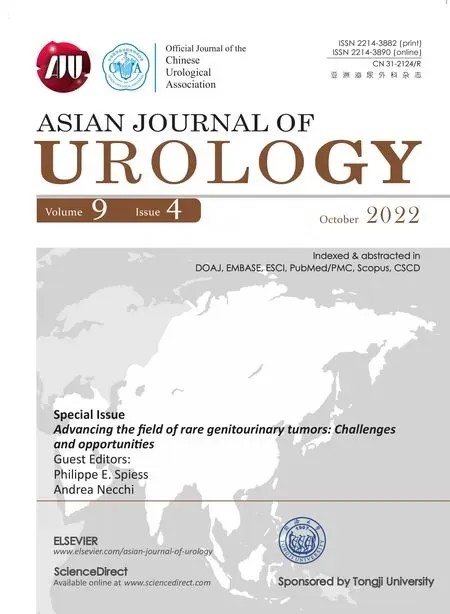Advancing the field of rare genitourinary tumors: Challenges and opportunities
Firstly,I would like to congratulate the editorial team of theAsian Journal of Urologyfor dedicating a special issue of the journal to this important topic.With recent advances in our fundamental understanding of the pathophysiology for many of these tumors in addition to access to high throughput comprehensive genomic profiling,we have heightened our characterization and classification of many of these rare genitourinary tumors (RGUTs) [1].There are some inherent challenges in making significant advances in the breadth of scientific knowledge pertaining to these tumors including: 1) limited number of cases treated at individual centers,2) lack of standardized (and often non-evidence-based standards)approaches in the diagnosis and management across the globe [2],and 3) significant under-funding related to research dedicated to these malignancies.In consequence,many of the patients and families facing such a diagnosis may have limited educational and treatment resources readily available to them[3].These critical limitations and inherent deficiencies were the premise for the establishment of the Global Society of Rare Genitourinary Tumors in December 2020 [4].
In this special issue,several important review articles are included beginning by a discussion on the dual pathogenesis of penile neoplasia by the world leader on the subject matter Prof.Antonio L.Cubilla,with a particular focus on the underlying pathophysiological basis of human papillomavirus related penile neoplasms.This is followed by a series of articles dedicated to providing an overview on penile sparing surgical approaches,systemic therapies for advanced disease,and on the use of radiotherapy in the management of primary and locally advanced tumors.These very complete and clinically relevant articles provide the fundamental and state of the art knowledge to care for patients using the most up to date and scientifically robust standards,with some discussion as to what is on the horizons of promising clinical and surgical care.In an exceptionally well put together comprehensive review on genitourinary melanoma led by the talented group at the Moffitt Cancer Center led by Prof.Jonathan S.Zager,a very timely overview of these tumors is provided as there have been significant advances in the outcomes of systemic therapies (namely immunotherapies)for advanced genitourinary melanomas and in addition as detailed by the authors,the optimal management of genitourinary melanoma significantly clearly benefits from the integration of multi-disciplinary care including surgical,medical,radiation,and disease site specifics in the areas of urology,gynecology,and dermatology.
In the articles that follow within this issue,there are very comprehensive reviews on primary urethral cancer,hereditary RGUTs including von Hippel Lindau and Lynch syndromes,and on extra-mammary Paget’s disease.These malignancies often constitute a clinical conundrum for practicing clinicians so these papers will be of great clinical interest and benefit to our readers.In the final chapter,one of the world leaders in genitourinary reconstruction Prof.David J.Ralph along with his team from the University College London Hospital in the United Kingdom discusses important surgical considerations and technical refinements in completion of phalloplasty following penectomy for penile cancer.
In summary,this special issue of theAsian Journal of Urologyshould constitute an invaluable resource for practicing urologists and healthcare professions caring for RGUTs.I strongly encourage our readers to incorporate many of the key diagnostic and therapeutic principles shared by our recognized global thought leaders that have contributed to this issue.We owe it to our patients and their families to continually strive for improvements in our continual efforts to not only cure most if not all patients but similarly minimize the sequelae of ensuing treatments which unfortunately can be lifelong in adversely impacting quality of life.
Author contributions
Study concept and design: Philippe E.Spiess,Andrea Necchi.
Drafting of manuscript: Philippe E.Spiess,Andrea Necchi.Critical revision of the manuscript: Philippe E.Spiess,Andrea Necchi.
Conflicts of interest
The authors declare no conflict of interest.
 Asian Journal of Urology2022年4期
Asian Journal of Urology2022年4期
- Asian Journal of Urology的其它文章
- The first Japanese case of intraductal cancer of the prostate with checkpoint kinase 2 mutation
- The relationship between sexually transmitted microorganisms and seminal quality in asymptomatic men
- Validation of Vesical Imaging Reporting and Data System score for the diagnosis of muscle-invasive bladder cancer: A prospective cross-sectional study
- Phalloplasty following penectomy for penile cancer
- Extramammary Paget’s disease: Updates in the workup and management
- Genitourinary manifestations of Lynch syndrome in the urological practice
